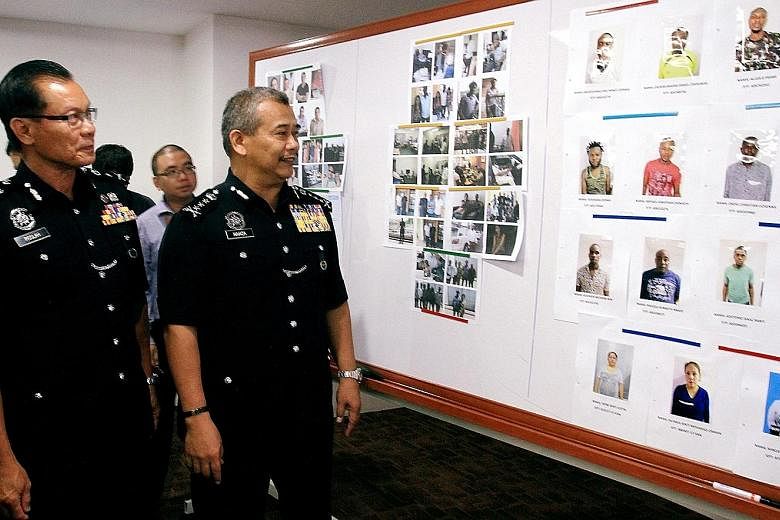KUALA LUMPUR • The "romance" out of Africa is so beguiling that Malaysian women gave away RM71 million (S$24 million) to love scam- mers last year in spite of frequent reports on the fraud in the media. These women topped the list of victims who lost a total of RM1 billion in online scams, The Star reported.
Bukit Aman Commercial Crime Investigations Department (CCID) director Mortadza Nazarene said cheating by Africans, which included love scams, recorded a significant increase last year in spite of the department's campaigns and media coverage over the modus operandi of these conmen.
Datuk Seri Mortadza said there were 14,627 cases of online scams last year, in which victims lost a total of RM1.09 billion. In 2014, 11,931 cases with losses amounting to RM816 million were recorded.
"It is very alarming that such cases are on an upward trend. This is because of the influx of foreign cyber criminals," he said in an interview, adding that police arrested 610 tricksters in 2014 and 417 last year.
Ninety per cent of African scam victims were women.
-
Cheat sheet
-
PARCEL SCAM
Victim "falls in love" with suspect via social media and is promised a parcel as proof of their love. A "Customs officer" or courier company will contact the victim, demanding a tax or insurance fee for the parcel.
Victim fails to receive parcel and the syndicate continues to ask victim for money.
LOVE SCAM
Victim starts a relationship through the Internet. "Lover" expresses wish to marry victim in Malaysia but is "arrested" upon arrival. Victim will be asked by suspect or syndicate members to pay for suspect's release.
BLACK MONEY SCAM
Fraudster convinces victim that piles of black-dyed banknote-sized paper are actual money. Lured by the promise of getting a share of the money, victim is persuaded into paying for chemicals to "clean" the money.
INVESTMENT SCAM
This comes in many forms - from a phone call offering an investment opportunity to an e-mail encouraging victims to buy shares. Victims are offered early access to a super gambling software or promised large tax deductions or refunds.
MACAU SCAM
Masterminds are usually foreigners with links in several Asean countries, including Indonesia, Laos, Cambodia and the Philippines. Posing as a police or bank officer, the fraudster contacts a prospective victim and says he or she is wanted for criminal offences such as money laundering.
Desperate to have their "criminal records" erased by police or the central bank, victims then transfer money into the fraudsters' accounts.
THE STAR/ASIA NEWS NETWORK
"Among the women targeted are those who are lonely, gullible, seeking love and those seen to be greedy," he said.
In one instance, a retired business executive in her 50s, who gave her name only as Marie, almost lost RM10,000 because of "love" two years ago. "I befriended a man via a social networking site. He claimed he was seeking genuine friendship. Our friendship grew after two months of contact," she said.
She said the man voiced interest in meeting her in Malaysia.
"Then I got a call from a courier company, which claimed that a package had arrived for me but was detained by Customs." She said she was asked to pay RM10,000 in cash to get it released.
"I refused to pay and called the man. He told me that he had sent the parcel as a gift to me. It all seemed so real but a close friend warned me not to pay.
"But the person, claiming to be from the courier firm, called me several times later to negotiate the sum," she said.
But she still decided not to pay and sent an e-mail to the man, saying that she did not need such luxuries and that she had made a police report. "A few months later, I checked his profile but it had already been taken down," she said.
A study commissioned earlier this year by the Telenor Group, a Norwegian multinational telecommunications company with operations in Europe and Asia, found that Malaysia was the country most vulnerable to Internet scams.
The Internet scam study was aimed at gaining a better understanding of common online rackets by polling 400 users, aged between 18 and 65, in four countries - Malaysia, India, Singapore and Thailand.
While Malaysia topped the list with 46 per cent of respondents saying they had been victims of Internet scams, followed by Thailand at 43 per cent, Singapore has the highest rate of identity fraud, according to the report.
About 46 per cent of the Malaysian respondents, all of whom described themselves as Internet users averaging nearly 10 hours per day on the Web, also said they knew a friend or family member who had been scammed online.
THE STAR/ASIA NEWS NETWORK

